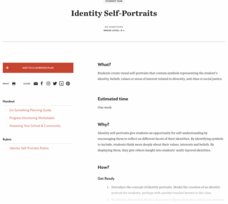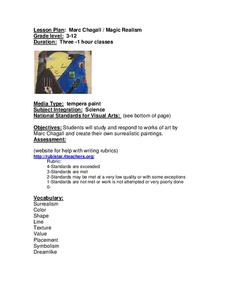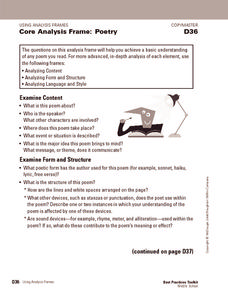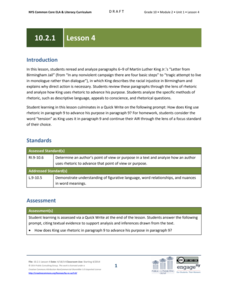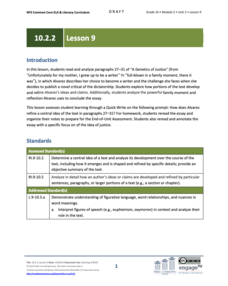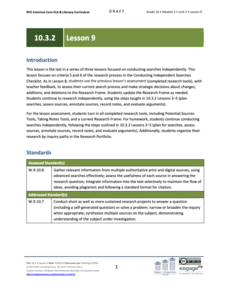Teaching Tolerance
Identity Self-Portraits
What symbols represent you best? Individuals consider how they would draw peers using symbols about their identities with an interview and art activity. After conducting interviews and portraits, the art makes a great centerpiece for...
Curated OER
A Leopard Doesn’t Change Its Spots
First, introduce rank badges, which were used during the Qing Dynasty. Then, the class will work together to uncover the meaning of the images they see. They'll examine and research the meaning behind the symbols found on Leopard Rank...
Curated OER
Figurative Language
What is figurative language, and why do we use it? Introduce your high schoolers to some examples and discuss the importance of including this element in your writing. After studying a text and searching for examples, writers will...
Duluth-Superior Area Educational Television Corporation
Marc Chagall / Magic Realism
Surrealistic painters like Marc Chagall and Wendy Rouse show viewers an expansive world in a small area. Young artists have a opportunity to create their own surrealistic paintings in response to a study of works by Chagall and Rouse.
Curated OER
William Faulkner's The Sound and the Fury: Narrating the Compson Family Decline and the Changing South
Students analyze the novel, "The Sound and the Fury," written by iam Faulkner, tracing the changing South. Through the narrative structure, the point of view, and the relationship between change and characterization, students view the...
Houghton Mifflin Harcourt
Core Analysis Frame: Poetry
Dig deep into any piece of poetry with a set of analysis questions. Ponder the content, form, and language of poetry and provide some question for critique. The first two pages include general questions, and the remainder of the document...
Curated OER
Analyzing the Use of Irony in a Short Story
Ninth graders examine how literature connects to real-life and see how irony aids in the development of theme. They read Shirley Jackson's The Lottery, and discuss elements of foreshadowing and situational irony. Then learners will write...
Dick Blick Art Materials
Peace Windows
Peace, love, tolerance, faith. Marc Chagall's Peace Window in the United Nations World Headquarters serves as a model for young artists as they create their own peace-themed transparent paintings. A great activity for both SPED and...
Curated OER
My Antonia: Body Biography Book Report
Examine the characters in Willa Cather's My Antonia with a group project. Small groups illustrate their chosen character on a large piece of paper and choose quotes from the text that tell about the character. Where students choose...
K20 LEARN
Voices from the Past: History and Literature
Art can enhance the understanding of history. That's the big idea in a lesson that has young scholars read Randall Jarrell's poem "The Death of the Ball Turret Gunner" and an excerpt from John Hersey's Hiroshima, which provide a...
Prestwick House
1984
Readers of Nineteen Eighty-Four use their answers to questions about George Orwell's tale to complete a crossword puzzle.
Sargent Art
Improvisation: Dada and Surrealism
Images of works by Salvador Dali, Luis Bunuel, and Man Ray launch a study of Dada and Surrealism. After critiquing works by these and other artists, class members gather their own images and arrange them into a cohesive composition.
Curated OER
Chinese Landscape Painting
Third graders learn about Chinese poetry and landscape paintings, then create their own. They view several examples and discuss the elements of each, then paint their own landscape inspired by what they saw. They then listen to, read,...
California Federation of Chaparral Poets, Inc
Poetic Devices
Have everything you need to know about the elements of poetry with a nine-page handout. Split into four categories—word sounds, meanings, arrangement, and imagery—budding poets may reference terms, read definitions, descriptions, and...
EngageNY
Grade 10 ELA Module 2: Unit 1, Lesson 4
Just read between the lines. Scholars analyze rhetorical devices in Martin Luther King Jr.'s letter by first discussing them with guided questioning. They then complete a rhetorical impact tracking tool before finishing the lesson plan...
EngageNY
Grade 10 ELA Module 2: Unit 1, Lesson 17
Scholars read the final paragraphs written by Martin Luther King Jr. in "Letter from Birmingham Jail." Readers work in groups to discuss King's word choice and point of view by completing graphic organizers. They also respond to a...
EngageNY
Grade 10 ELA Module 2: Unit 2, Lesson 4
What does it mean to come undone? Scholars consider the author's use of the phrase as they read paragraphs 12–15 from Julia Alvarez's autobiographical essay "A Genetics of Justice." They complete a quick write to analyze how Alvarez...
EngageNY
Grade 10 ELA Module 2: Unit 2, Lesson 2
What is a megalomaniac? Scholars discover the word's meaning as they read and analyze paragraphs seven and eight from Julia Alvarez's essay "A Genetics of Justice." They also read Mark Memmott's article "Remembering to Never Forget" and...
EngageNY
Grade 10 ELA Module 2: Unit 2, Lesson 9
How do authors develop the main ideas in their writing? Pupils consider the question as they read and analyze paragraphs 27–31 from Julia Alvarez's essay "A Genetics of Justice," in which Alvarez describes her decision to become a...
EngageNY
Grade 10 ELA Module 3: Unit 2, Lesson 9
Do you know what the plan is? Scholars are now ready to complete the final instructional activity of independent research before finalizing their plans. Ultimately, they turn in all research tool sheets and frames and organize their...
EngageNY
Grade 10 ELA Module 4: Unit 2, Lesson 6
What decisions might an author make about the structure of a play? Pupils participate in an evidence-based discussion about Shakespeare's choices in Macbeth. Next, scholars analyze the effect of Shakespeare's structural choices in Act 2,...
EngageNY
Grade 10 ELA Module 4: Unit 2, Lesson 9
How does Shakespeare develop the central idea of agency versus fate in Macbeth? Using the resource, pupils work in small groups to discuss the plot of Act 3.1. Next, they complete a brief writing assignment to analyze how the main idea...
EngageNY
Grade 10 ELA Module 4: Unit 2, Lesson 13
Lady Macduff uses a metaphor to suggest that her husband does not possess the courage of even a tiny, short-winged bird—ouch! Using the resource, pupils discover Act 4.2 of Shakespeare's Macbeth. Using reading, writing, and discussion,...
EngageNY
Grade 10 ELA Module 4: Unit 2, Lesson 10
Is it better to be dead than to "dwell in doubtful joy," as Lady Macbeth suggests in Act 3.2 of Shakespeare's Macbeth? Using the resource, scholars work in small groups to discuss how Lady Macbeth and Macbeth begin to unravel following...
Other popular searches
- Symbolism Art
- Symbolism in Art
- Rock Art Symbolism
- Renaissance Art Symbolism
- Visual Art Symbolism
- Language Art Symbolism
- Symbolism Art Latin America
- Identifying Symbolism in Art
- Identify Symbolism in Art
- Symbolism in 17th Century Art
- Symbolism in Art History
- Symbolism in Art K


